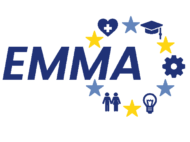-
EMMA consortium conducts online training on Moodle 4.2

By

Author name and affiliationn: Marvin D. Hoffland, Carinthia Univ. of Applied Sciences/FH Kärnten Take home points:1) It is possible to conduct effective on-line training if planned out accordingly. 2) Create a sandbox to let the participants play! Conducting training on how to use educational learning management platforms can be quite a daunting task due to…
-
Informing and involving potential users and other stakeholders

By

The first face-to-face multiplier event (ME) was organised in the premises of the Department of Nursing, National and Kapodistrian University of Athens on the 20th of May 2022. In this event 34 persons participated representing academics, possible students, older people and employers. Also, 9 participants from the partner universities and 5 from the organising university…
-
Multi-university training in online pedagogy – well worth your time

By

As part of developing our online Masters in Active Ageing and Age Friendly societies, the EMMA consortium came together to learn more about online pedagogy in a three-day training event hosted by University College Cork (UCC) in late 2021. Fittingly, this event was itself online! The participants included three core groups: educators (i.e. lecturers/teaching faculty);…
-
Key elements of curriculum framework

By

DEVELOPING CURRICULUM FRAMEWORK: moving from a vision to deciding the structure and rules of a Masters program This blog concentrates on the development of curriculum framework for EMMA Master program. To do this, we gathered information both about national and university level requirements and recommendations for master programs. Correspondence between European Qualifications Framework (EQF) and…
-
Stakeholder Input on the Proposed Master’s Programme

By

The EMMA consortium, spread throughout Europe are developing an interdisciplinary master’s programme. A major stage of this which is underway is constructing the content of the master’s in healthy and active ageing, we wanted to know what our stakeholders thought important too. All of us working on the EMMA project collaboratively devised a survey, incorporating the results…
-
Early Technical Challenges in Producing a Joint Online Master’s Programme in EMMA – LTI Solution Explored

By

The following statement is taken from the EMMA project website: “The EMMA programme will be delivered online, allowing future students to study from anywhere”. It is a great undertaking and one with challenges both pedagogically and technically. In Output 5 of the programme, we have so far explored both of these challenges, but in this…
-
Mobility and Active Ageing Conference Report

By

Despite COVID 19 and the restrictions, the EMMA team in Portugal was successful in organizing a conference to present the EMMA project and to highlight the relevance of Mobility for Active/Healthy Ageing. The Mobility and Active/Healthy Ageing Conference which was held online on the 8th of September 2021 was an open and free event that…
-
EMMA Quality Assurance Shows Us The Way Further

By

Why Quality Assurance is needed in a project? A successful and ambitious process most often needs to be reflected and monitored on regular basis. EMMA consortium is creating something very new and innovative. The development of the European master on healthy and active ageing creates common practices and shared conceptual knowledge, and the on-line master…
-
Guest: “Elderly” or “Elders of the Tribe”

By

A guest blog by Elders for Earth. Though now in our eighties, we prefer not to think of ourselves as elderly. That word is often used in a context where older people are seen – and so see themselves – either as problems to be dealt with or as retirees who have earned the right…
